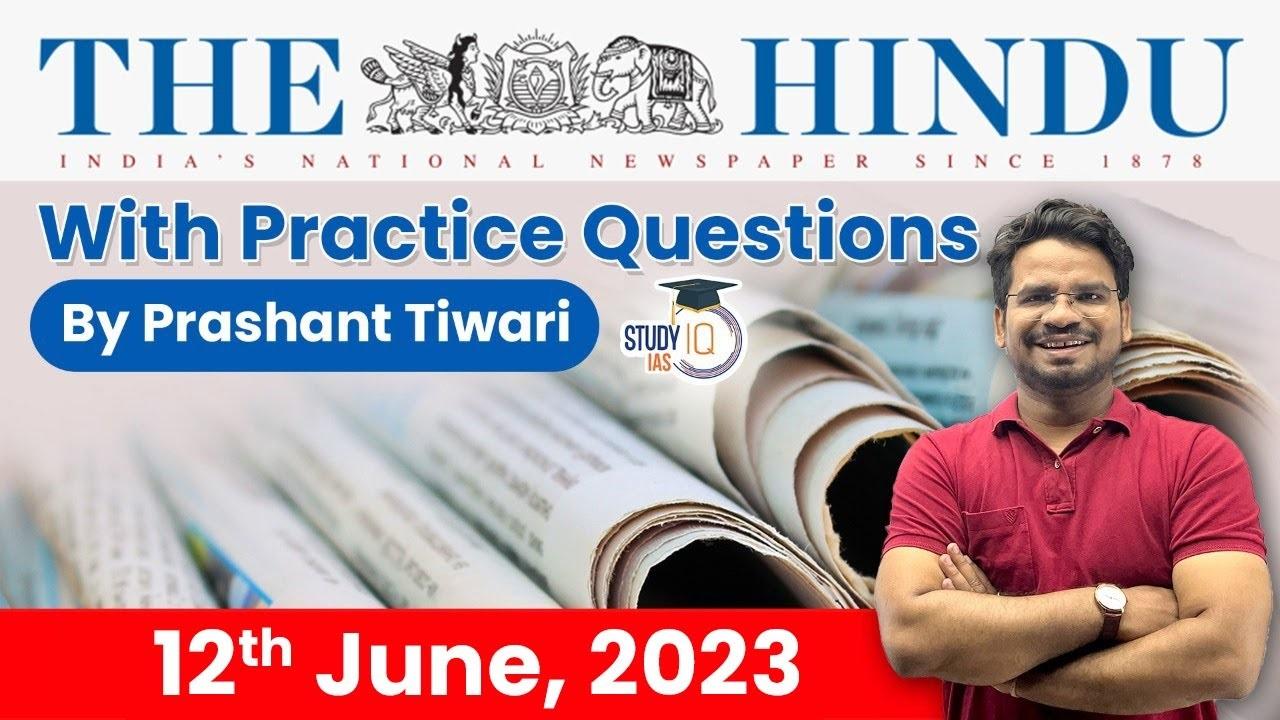The Hindu Newspaper Analysis for UPSC

The Hindu Newspaper Analysis 10 June 2023
- A deep depression over the southeast Arabian Sea intensified into a cyclonic storm ‘Biparjoy’, said the India Meteorological Department (IMD).
- The name ‘Biparjoy’ was given by Bangladesh. It means ‘calamity’ or ‘disaster’. Reportedly, the name was adopted by World Meteorological Organisation (WMO) countries in 2020.
- Tropical cyclones typically form over large bodies of relatively warm water. Warm water > Evaporation > Rising up of air > Low Pressure area.

- Depending on its location and strength, a tropical cyclone is referred to by different names:
- Cyclones in the Indian Ocean
- Hurricanes in the Atlantic
- Typhoons in the Western Pacific and the South China Sea
- Willy-willies in Western Australia
- Conditions favorable for the formation
- Large sea surface with temperature higher than 27° C;
- Presence of the Coriolis force;
- Small variations in the vertical wind speed;
- pre-existing weak low-pressure area or low-level-cyclonic circulation
- Naming Of Cyclones
- Adopting names for cyclones makes it easier for people to remember, as opposed to numbers and technical terms.
- Cyclones that form in every ocean basin across the world are named by the regional specialized meteorological centers (RSMCs) and Tropical Cyclone Warning Centres (TCWCs).
- There are six RSMCs in the world, including the India Meteorological Department (IMD), and five TCWCs.
- The IMD is mandated to naming of cyclones as well as issuing advisories to 13 countries in the region on the development of cyclones and storms, namely Bangladesh, India, Maldives, Myanmar, Oman, Pakistan, Sri Lanka, Thailand, Iran, Qatar, Saudi Arabia, United Arab Emirates and Yemen.

- The ethnic divide and violence seems to suggest that little has changed in the northeast, notwithstanding the many developments in place.
- An additional dimension in the northeast is the presence of ethnic sub-nationalism and identity politics in an aggravated form. Ethnic allegiance had oftentimes been in conflict with mainstream nationalism or vice-versa previously, but it was hoped that such tensions had subsided.
- Understanding cultural factors are critical, specially in times of conflict.
- The impression that Delhi is neutral in any conflict, and is only on the side of justice has to be properly communicated.

- To unlock the full potential of India’s future, we have to prioritise the health and nutrition of its adolescent girls. Adolescence is a pivotal period of cognitive development and, therefore, improving access to nutrition during this “second window of opportunity of growth” compensates for any nutrient deficiencies acquired during early developmental stages in the girl child.
- Furthermore, adolescent health is a significant indicator of women’s labour force participation in India in the long term, as better nutrition improves every young girl’s prospect to participate in productive activities.
- Adolescent girls are particularly vulnerable to undernutrition and anaemia due to the onset of menstruation. The findings of the National Family Health Survey-5 (2019-21) confirm these concerns, as a staggering 59.1% of adolescent girls were found to be anaemic. With the NFHS-4 numbers also having reported over 41.9% of school-going girls as underweight, the numbers showcase a worrying trend.
- Anaemic Condition:
- It is a condition in which the number of red blood cells or their oxygen-carrying capacity is insufficient to meet physiologic needs, which vary by age, sex, altitude, smoking, and pregnancy status.
- Causes:
- Iron deficiency is the most common cause of anaemia, although other conditions, such as folate, vitamin B12 and vitamin A deficiencies, chronic inflammation, parasitic infections, and inherited disorders can all cause anaemia.
- In its severe form, it is associated with fatigue, weakness, dizziness and drowsiness. Pregnant women and children are particularly vulnerable.

- Recently issues have arisen in various States between Chief Ministers and Governors, with regard to the passing of Bills. Chief Ministers feel that Governors have not acted for an unduly long period of time on Bills presented for their assent.
- The Legislature of a State comprises the Governor and the Legislative Assembly (if the State has one House) and a Legislative Council (if the State has two Houses).
- The Governor has little autonomy in his functioning — it is a settled legal position that he can act only on the “advice” of his Council of Ministers, with the Chief Minister as the head of the Council.
- The intention of the framers of the Constitution was for the President or Governor to act only on the advice of the Council of Ministers. Actual governance of the country/State is by the Prime Minister or the Chief Minister as the case maybe.
- In Shamsher Singh v State of Punjab (1974), the Supreme Court held that a President or a Governor can exercise their discretion independent of their Ministers only where the Constitution expressly permits them to do so.
- Article 200 states that when the Governor is presented with a Bill, he can either give his assent or withhold it or return the Bill with certain suggestions.
- The procedure to be followed when presidential assent for such a Bill is required is set out in Article 201 of the Constitution.
- Though the Constitution prescribes no express time limit, the first proviso does mention that the Governor ought to either give his assent or send the Bill back to the House as soon as possible





















 WhatsApp
WhatsApp